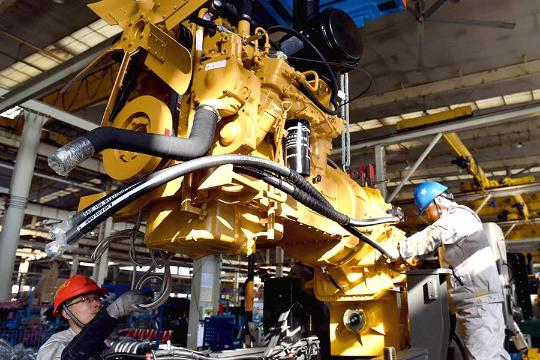Manufacturing expands amid policy push
China's manufacturing activity expanded last month for the first time in half a year, official data showed on Thursday, as stimulus measures boosted production and revived confidence, boding well for fourth-quarter economic momentum and the full-year growth outlook.
Nevertheless, analysts said that it may still be too early to conclude that the Chinese economy had fully bottomed out, as the challenges of insufficient demand and property woes persisted, making intensive stimulus that is "rare in a noncrisis period" still likely in 2025.
Wen Bin, chief economist at China Minsheng Bank, said, "With additional policies to be introduced and synergistic policy effects to unfold, the economy is on track for stable growth in the fourth quarter after factory activity improved in October."
Wen added that "it is highly possible for the country to meet the annual economic and social targets. However, the policy transmission to help the economy bottom out still needs to be strengthened, which is evident in areas such as lukewarm manufacturing new orders and the subdued vitality of smaller enterprises."
The official purchasing managers index for the manufacturing sector rose for the second consecutive month to 50.1 in October, standing above the 50 mark that separates expansion from contraction for the first time in six months, the National Bureau of Statistics said on Thursday.
The reading was up from 49.8 in September and stood above 49.9, as many analysts had expected, mostly driven by accelerated production activity, while new market orders remained generally unchanged with improving domestic demand offsetting weakening export orders.
A subindex gauging manufacturers' expectations in terms of production and operations came in at 54, up significantly from 52 in September and hitting a four-month high, the NBS said.
Sentiment in the broader economy also improved. The composite PMI, covering both manufacturing and nonmanufacturing activity, came in at 50.8 in October, up from 50.4 a month earlier.
"With the introduction of a package of incremental policies and the effects of existing policies gradually emerging, China's economic vitality continued to pick up in October," said Zhao Qinghe, an NBS statistician.
Despite the overall pickup, the bureau said that the PMI for small manufacturers dropped from 48.5 in September to 47.5 in October, indicating worsening operating conditions.
Even with an acceleration in infrastructure construction, the PMI for the construction sector declined from 50.7 in the previous month to 50.4 in October, which analysts attributed to a lingering slackness of real estate construction.
As manufacturers' new export orders further contracted in October, Betty Wang, lead economist at British think tank Oxford Economics, said that China's exports may soften in the fourth quarter as the global semiconductor cycle is likely to reach its peak.
Wang said that broad coordination between monetary and fiscal policy support is still likely over the next few quarters to support growth, which is "rare in a noncrisis period".
In particular, Wang said her team expects the government to increase its spending by 2 trillion to 3 trillion yuan ($281 billion to $421 billion) next year, financed by special treasury bonds, in areas such as infrastructure investment and assistance to targeted household groups.
On the monetary front, Zhu Haibin, chief China economist at JPMorgan, said his team expects the People's Bank of China, the country's central bank, to cut the policy benchmarks of interest rates twice in 2025 — by 10 basis points each — along with two cuts to the reserve requirement ratio, of 25 basis points each.
"Fiscal and monetary policy will not quickly swing back to neutral or a tightening stance as observed in recent years, aiming to support a continuous recovery in the coming quarters," said Zhu, who had revised upward the 2025 full-year growth forecast for China, from 4 percent to 4.6 percent year-on-year.
As part of China's intensified efforts to shore up the property market, the central bank decided to implement a normalized adjustment mechanism to narrow the gap between the interest rates of existing mortgages and new mortgages, starting on Friday.

